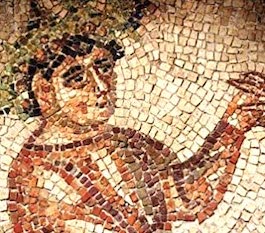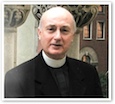Our days of high political fever
- FATHER GEORGE W. RUTLER
In one survey of grammarians, two words deemed to be among the most beautiful sounding in the English language were Agape and Philadelphia.
 The problem is that these actually are Greek. There also are many aphorisms in the English language that have become so familiar that one may not realize that their sources are in antiquity. Take for instance "Who will watch the watchers?"—which originally was a phrase of the Roman poet Juvenal (b. 55 AD). He also coined the expression "a sound mind in a sound body," and in college we were not allowed to forget its Latinity, for it was written on a wall of the gymnasium: "Mens sana in corpore sano."
The problem is that these actually are Greek. There also are many aphorisms in the English language that have become so familiar that one may not realize that their sources are in antiquity. Take for instance "Who will watch the watchers?"—which originally was a phrase of the Roman poet Juvenal (b. 55 AD). He also coined the expression "a sound mind in a sound body," and in college we were not allowed to forget its Latinity, for it was written on a wall of the gymnasium: "Mens sana in corpore sano."
Juvenal had a talent for lapidary expressions, and I suppose his most common one is "bread and circuses" from his Satire X. Precisely because he was satirical, he was not popular among the more thin-skinned Romans. Juvenal was of the senatorial caste, and much of a snob, for he disdained what some of our contemporary politicians have called "a basket of deplorables." But his point was well taken at least in the sense that the majority of the populace could be controlled by being offered things, like government subsidies and sports, in exchange for the freedom they had enjoyed in republican Rome before Augustus created the imperial "deep swamp" that eventually led to the moral decay of their civilization.
In our days of high political fever, one need not embellish the cultural parallels. A natural philosophical school of Stoics disdained vulgar seductions by the imperium, but they were of little threat, and when they became political obstacles, they could be eliminated the way Nero compelled Seneca to kill himself shortly before his elder brother Gallio did the same. It is not irrelevant to the story that Gallio was the proconsul of Achaia, and the just judge who dismissed the case against Saint Paul (Acts 18:12-17). It was the emergence of the strange new cult worshiping a "Christos," whom his followers said had risen from the dead in the backwater of Judea, that began to threaten the Roman "deep state."
Political discourse today has degenerated into riots because what is at stake is not a mere matter of government, but a crisis of humanity itself. There is a portion of the people that, as Juvenal satirized, "anxiously hopes for just two things: bread and circuses," but behind their superficial choice of living are sinister forces as from a swamp that would subvert by anarchy all that the Christian mind knows to be true.
About one-fifth of the citizens in the United States are Catholic, and how they vote will determine how many of them really are faithful to the "Christos" who asked, "For what does it profit a man, if he shall gain he whole world, and lose his own soul?" (Matthew 16:26)
 This is Meaghen Gonzalez, Editor of CERC. I hope you appreciated this piece. We curate these articles especially for believers like you.
This is Meaghen Gonzalez, Editor of CERC. I hope you appreciated this piece. We curate these articles especially for believers like you.
Please show your appreciation by making a $3 donation. CERC is entirely reader supported.

Acknowledgement
 Father George W. Rutler. "Our days of high political fever." From the Pastor (October 25, 2020).
Father George W. Rutler. "Our days of high political fever." From the Pastor (October 25, 2020).
Reprinted with permission of Father George W. Rutler.
The Author
 Father George W. Rutler is the pastor of St. Michael's church in New York City. He has written many books, including: The Wit and Wisdom of Father George Rutler, The Stories of Hymns, Hints of Heaven: The Parables of Christ and What They Mean for You, Principalities and Powers: Spiritual Combat 1942-1943, Cloud of Witnesses — Dead People I Knew When They Were Alive, Coincidentally: Unserious Reflections on Trivial Connections, A Crisis of Saints: Essays on People and Principles, Brightest and Best, and Adam Danced: The Cross and the Seven Deadly Sins.
Father George W. Rutler is the pastor of St. Michael's church in New York City. He has written many books, including: The Wit and Wisdom of Father George Rutler, The Stories of Hymns, Hints of Heaven: The Parables of Christ and What They Mean for You, Principalities and Powers: Spiritual Combat 1942-1943, Cloud of Witnesses — Dead People I Knew When They Were Alive, Coincidentally: Unserious Reflections on Trivial Connections, A Crisis of Saints: Essays on People and Principles, Brightest and Best, and Adam Danced: The Cross and the Seven Deadly Sins.




